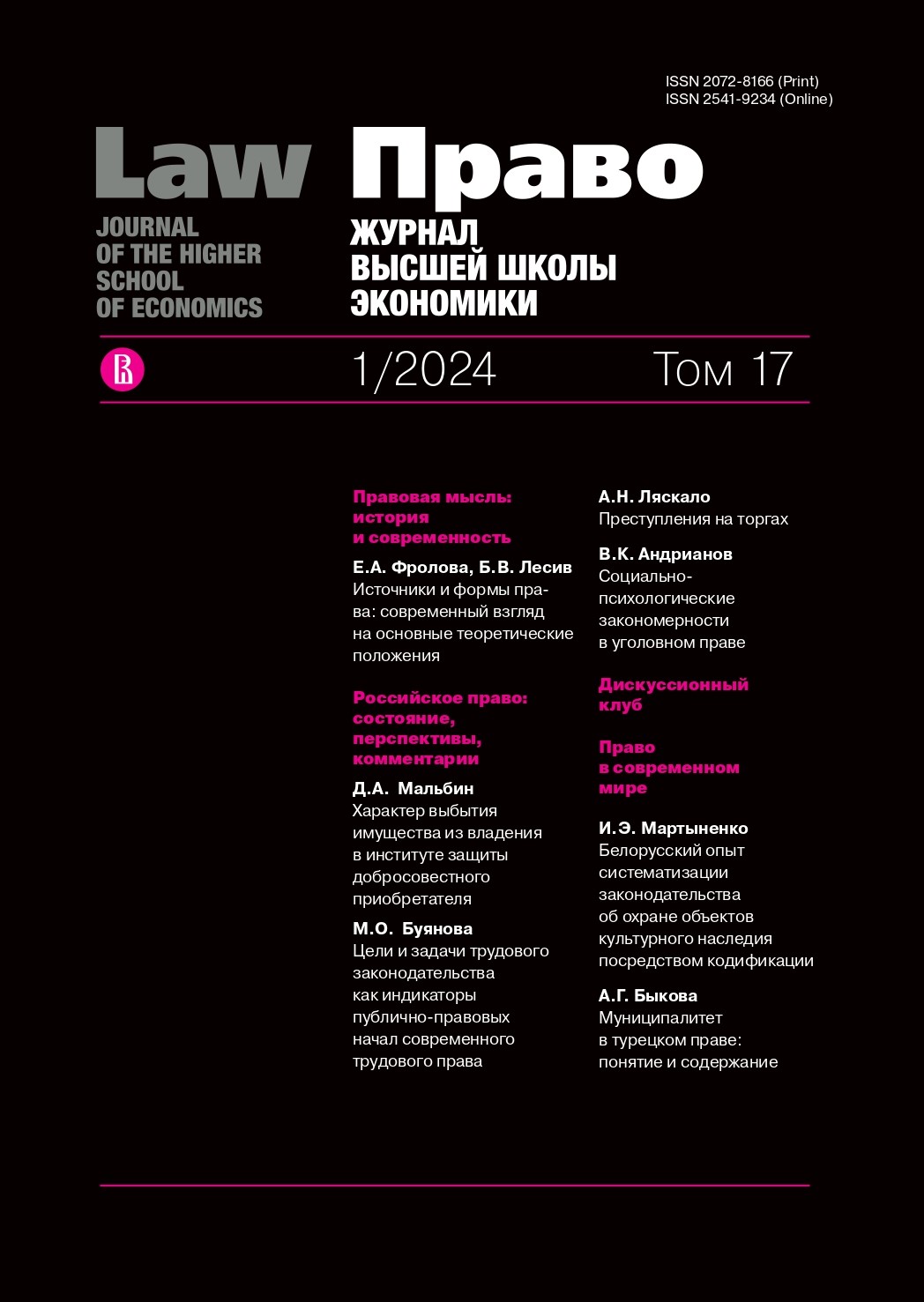Influence of the Soviet (Russian) Law on the Chinese Criminal Procedure Laws
Аннотация
The first Criminal Procedure Law (CPL) of China issued in 1979 was greatly influenced by the Soviet Criminal Procedure Law in multiple dimensions including the framework, concepts, principles, and specific institutions. Although the Chinese CPL has changed a lot after three amendments in 1996, 2012 and 2018 respectively, the influence of the Soviet Law can still be noticed in many aspects of the current law. The paper explores how the Soviet Law has shaped Chinese Criminal Procedure Law into the way it is. Part I explores the historical development of Chinese CPL, indicating the close relationship between the Chinese Law and the Soviet Law. Part II compares Chinese CPLs with the Soviet (and its successor Russia) CPLs, trying to identify their similarities and differences. In the Part III the author draws tentative conclusions from the comparison and predicts the continuing influence of the Russian law model on Chinese CPLs in the future. The paper primarily relies on comparative study and historical analysis. The legal framework, legal terms, theories, principles, and specific institutions will be examined to illustrate the great influence of the Soviet Law on Chinese Criminal Procedure Law. The study will help to better understand the evolution of Chinese criminal procedure law and to predict more accurately its further development.
Литература
Bian J., Xie S. (2019) The Birth and Development of the Criminal Procedure System in the New China: to the 70th Anniversary of the Founding of the PRC and the 40th Anniversary of the Promulgation of the Criminal Procedure Law. Jinan Xuebao (zhexue yu shehui kexue ban)=Jinan Journal (Philosophy and Social Sciences), no.10, pp. 1-11 (in Chinese)
Cheltsov M.A. (1955) Soviet Criminal Procedure. Beijing: Law Press, 660 p. (in Chinese)
Chen G., Chen H., Wei X. (2001) Evidential System and Epistemology. Zhong Guo Fa Xue=China Legal Science, no.1, pp. 37-52 (in Chinese)
Chen G. et al. (1999) Fifty Years of Criminal Procedure Jurisprudence. Beijing: Police Educational Press, 743 p. (in Chinese) DOI: https://doi.org/10.1163/9789004635449_012
Chen G. et al. (2021) Criminal Procedure Law. 7th ed. Beijing: University Press, 535 p. (in Chinese)
Chen R. (1997) Criminal Procedure Jurisprudence in Twentieth Century China. Zhong wai fa xue=Peking University Law Journal, no. 6, pp. 1-23 (in Chinese)
Chen R. (2006) Private Cooperation Models in Criminal Proceedings — The Rise of Criminal Reconciliation in China. Zhong guo fa xue = China Legal Science, no. 5, pp.15-30 (in Chinese)
Chugunov V.Y. (1957) Lectures on Soviet Criminal Procedure. Beijing: Beijing University of Political Science and Law, 326 p. (in Chinese)
Durmanov H.D. (1951) Basics of Criminal Procedure. Beijing: People's Publishing House, 54 p. (in Chinese)
Guo Z. (2021) Research on the Development of Chinese Criminal Procedure Law in the Past Four Decades. Zhong guo fa xue=China Legal Science, no. 5, pp. 3-29 (in Chinese)
Johnson W. (ed.) (1979) The Tang Code. Vol. I: General Principles. Princeton: Princeton University Press, 317 p.
Lan Y. (2019) Reform of Criminal Case Filing System from the Perspective of Trial Center. Xue shu jie=Academics, no. 9, pp. 142-149 (in Chinese)
Li C., Bian J. (2010) An Initial Study of the Relationship between Criminal Law and Criminal Procedural Law: chaos, separation, rupture, connection and coordination. Gui zhou da xue bao (she hui ke xue ban)=Journal of Guizhou University (Social Sciences), no. 5, pp. 54-63 (in Chinese)
Liu S. (1954) Report on the draft of PRC's Constitution at the First Session of the First National People's Congress of the People's Republic of China on September 15, 1954 (in Chinese)
Song Y. et al. (2014) Criminal Procedure Law Revision: Historical Tracing and Analysis.Beijing: University Press, 436 p. (in Chinese)
Tatsuhiko U., Kang S. (1980) The Principle of Presumption of Innocence in Soviet Criminal Procedure Law. Zhong wai fa xue=Peking University Law Journal, no.1, pp. 58-66 (in Chinese)
Vyshinsky A.Ya. (1954) The Procedural Evidence Theory in Soviet Law. Beijing: People's Publishing House, 355p. (in Chinese)
Wu H., Zhong S. et al. (2012) Centenary of China's Code of Criminal Procedure. Beijing: China University of Political Science and Law Press, 882 p. (in Chinese)
Xiong Q. (2019) System of Pleading Guilty and Accepting Punishments with Leniency in the Perspective of Comparative Law: A Review on the Fourth Paradigm of Criminal Procedure. Bi jiao fa yan jiu=Journal of Comparative Law, no. 5, pp. 80-101 (in Chinese)
Yuan Y. (2012) Reflection on basic issues of the defense system — from the perspective of relevant criminal law revisions in Soviet Russia, China, and the Russian Federation. Zheng fa lun tan=Tribune of Political Science and Law, no. 6, pp. 44-50 (in Chinese)
Yuan Y. (2014) Deconstruction of Criminal Defense Right in China: Taking the Related Amendment of Legislation of Soviet Union and Russia for Reference. Shan xi da xue bao (zhe xue she hui ke xue ban)=Journal of Shanxi University (Philosophy & Social Science), no. 3, pp. 97-103 (in Chinese)
Zhang J. (2019) The Tradition and Modern Transition of Chinese Law. 4th ed. Beijing: Law Press China, 523 p. (in Chinese)
Zhang Z. (1983) Commentary on the Presumption of Innocence. Zhong guo zheng fa da xue bao=Journal of CUPL, no. 4, pp. 14-22 (in Chinese)
Zhou G. (1991) Establishment of the Principle of Crime from Proof: on the Critical Succession of the Presumption of Innocence. Zheng fa lun tan (zhong guo zheng fa da xue bao)=Tribune of Political Science and Law, no. 3, pp. 14-23 (in Chinese)
Copyright (c) 2024 Право. Журнал Высшей школы экономики

Это произведение доступно по лицензии Creative Commons «Attribution-ShareAlike» («Атрибуция — На тех же условиях») 4.0 Всемирная.


















